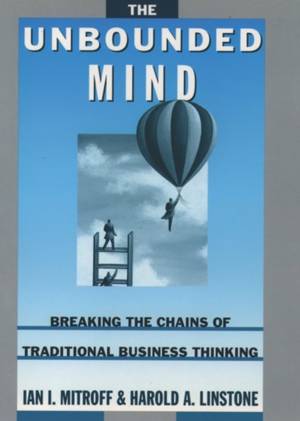
Je cadeautjes zeker op tijd in huis hebben voor de feestdagen? Kom langs in onze winkels en vind het perfecte geschenk!
- Afhalen na 1 uur in een winkel met voorraad
- Gratis thuislevering in België vanaf € 30
- Ruim aanbod met 7 miljoen producten
Je cadeautjes zeker op tijd in huis hebben voor de feestdagen? Kom langs in onze winkels en vind het perfecte geschenk!
- Afhalen na 1 uur in een winkel met voorraad
- Gratis thuislevering in België vanaf € 30
- Ruim aanbod met 7 miljoen producten
Zoeken
The Unbounded Mind
Breaking the Chains of Traditional Business Thinking
Ian I Mitroff
Paperback | Engels
€ 61,45
+ 122 punten
Omschrijving
Global markets, Japanese competition, the service economy, the sophisticated consumer--American business today faces challenges undreamed of just a few decades ago, and traditional approaches to corporate problems are becoming increasingly less effective. And yet, as the authors of The Unbounded Mind point out, MBA programs still preach--and thousands of American firms hold sacred--an antiquated system of business thinking that is wholly inadequate to the problems they face.
In this groundbreaking work, two pioneering thinkers in business studies, Ian I. Mitroff and Harold A. Linstone, pinpoint the profound changes that must occur in the way business executives think, make decisions, and solve problems, if America is to remain competitive. They put forth a radically new approach--"new thinking"--and show executives exactly how to employ these special critical and creative tools to clear the hurdles businesses now face. Logic and rationality, they explain, are useful but limited. And traditional simplification often inhibits the ability to ask the right questions and recognize the true problem. But varying perspectives, multiple realities, and openness to multiple solutions are the secrets of contemporary problem-solving, and lead us to the cutting edge of innovation. Clearly and compellingly, Mitroff and Linstone weave together insights gleaned from philosophy, psychology, management science, economics, and decision science, and quote thinkers from Descartes to Robert Bly, from Alvin Toffler to Chief Seattle. In illustrating how "new thinking" differs from the usual ways in which American firms have handled problems, they analyze a wealth of examples including the decline of the American auto industry and the consequences of this country's blind exporting of technology. They also revisit and interpret some of the most grave crises corporate America has faced: the Bhopal disaster, the Tylenol scare, and the accident at Three Mile Island.
Hard-hitting and insightful, The Unbounded Mind is a clarion call for American business. It argues that if we are to produce products and services that can compete in the information age, we must challenge the very foundations of our thinking, and learn how to approach decisionmaking in a truly creative way.
In this groundbreaking work, two pioneering thinkers in business studies, Ian I. Mitroff and Harold A. Linstone, pinpoint the profound changes that must occur in the way business executives think, make decisions, and solve problems, if America is to remain competitive. They put forth a radically new approach--"new thinking"--and show executives exactly how to employ these special critical and creative tools to clear the hurdles businesses now face. Logic and rationality, they explain, are useful but limited. And traditional simplification often inhibits the ability to ask the right questions and recognize the true problem. But varying perspectives, multiple realities, and openness to multiple solutions are the secrets of contemporary problem-solving, and lead us to the cutting edge of innovation. Clearly and compellingly, Mitroff and Linstone weave together insights gleaned from philosophy, psychology, management science, economics, and decision science, and quote thinkers from Descartes to Robert Bly, from Alvin Toffler to Chief Seattle. In illustrating how "new thinking" differs from the usual ways in which American firms have handled problems, they analyze a wealth of examples including the decline of the American auto industry and the consequences of this country's blind exporting of technology. They also revisit and interpret some of the most grave crises corporate America has faced: the Bhopal disaster, the Tylenol scare, and the accident at Three Mile Island.
Hard-hitting and insightful, The Unbounded Mind is a clarion call for American business. It argues that if we are to produce products and services that can compete in the information age, we must challenge the very foundations of our thinking, and learn how to approach decisionmaking in a truly creative way.
Specificaties
Betrokkenen
- Auteur(s):
- Uitgeverij:
Inhoud
- Aantal bladzijden:
- 192
- Taal:
- Engels
Eigenschappen
- Productcode (EAN):
- 9780195102888
- Verschijningsdatum:
- 14/12/1995
- Uitvoering:
- Paperback
- Formaat:
- Trade paperback (VS)
- Afmetingen:
- 138 mm x 217 mm
- Gewicht:
- 249 g

Alleen bij Standaard Boekhandel
+ 122 punten op je klantenkaart van Standaard Boekhandel
Beoordelingen
We publiceren alleen reviews die voldoen aan de voorwaarden voor reviews. Bekijk onze voorwaarden voor reviews.









